Keyword clustering has become a major requirement in SEO today.
The latest trend points toward a single page ranking for thousands of keywords.
Understanding the relationship between different keywords allows you to target a broad bunch of search terms within the same content.
Clustering is crucial for building search intent-based content as it helps users find information in different ways.
There are many free and paid tools that help with keyword clustering. To help you with your search, we’ve selected the top 5 keyword clustering tools and we’ll discuss each tool in detail.
Here’s everything you need to know.
Table of Contents
How to Choose a Keyword Clustering Tool
Keyword clustering tools help content marketers with research and strategy.
They can cluster your most relevant search terms into groups. To find a keyword clustering tool that fits your business needs and requirements, here’s what you should consider:
Type of clustering algorithm
The most essential factor to consider when choosing a keyword clustering tool is its mode of operation or the type of clustering algorithm it follows.
For instance, some keyword grouping tools collect live SERP data in their analysis, while others are more traditional and use semantic clustering as the standard approach.
It’s important to evaluate the accuracy of the clustering algorithm and find a balance between functionality and ease of use.
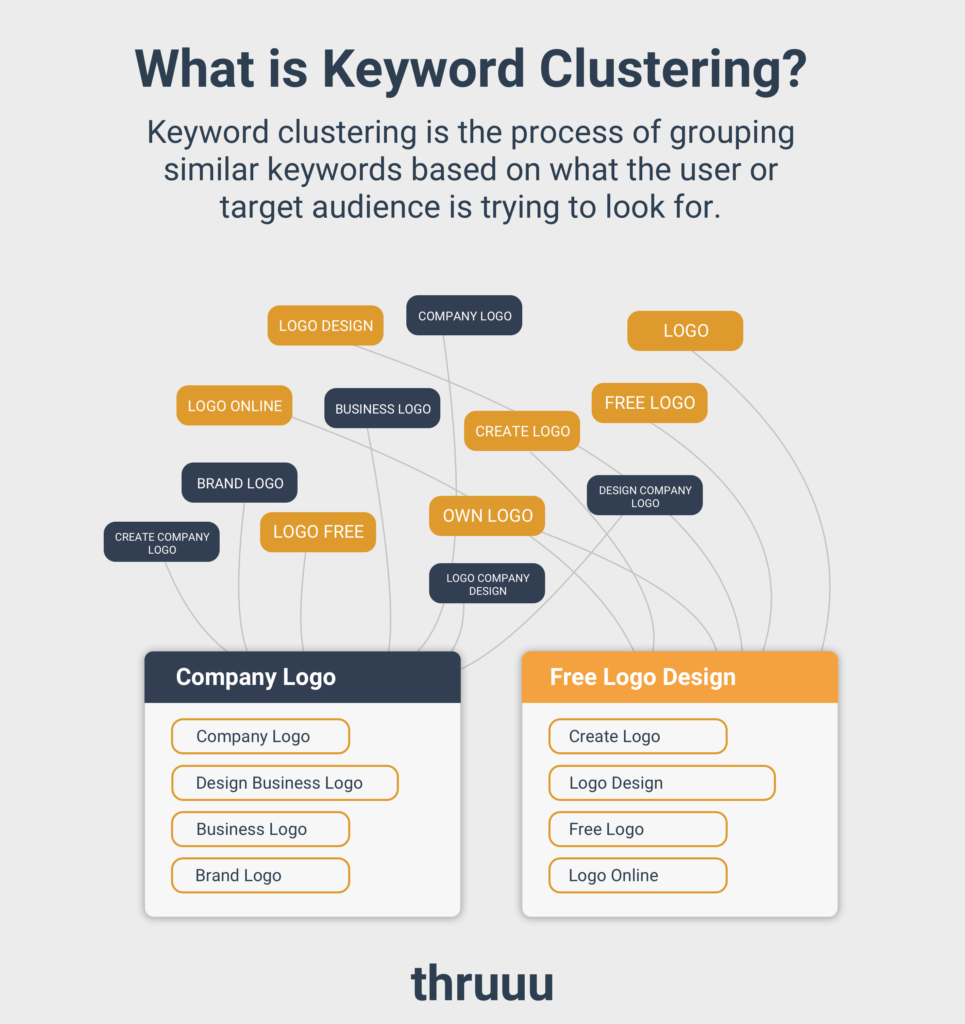
User experience and user interface
Some of the best keyword clustering tools provide excellent user experience and interface to users around the world.
Most tools are designed with a user-friendly dashboard that gives access to all kinds of features, reports and assets.
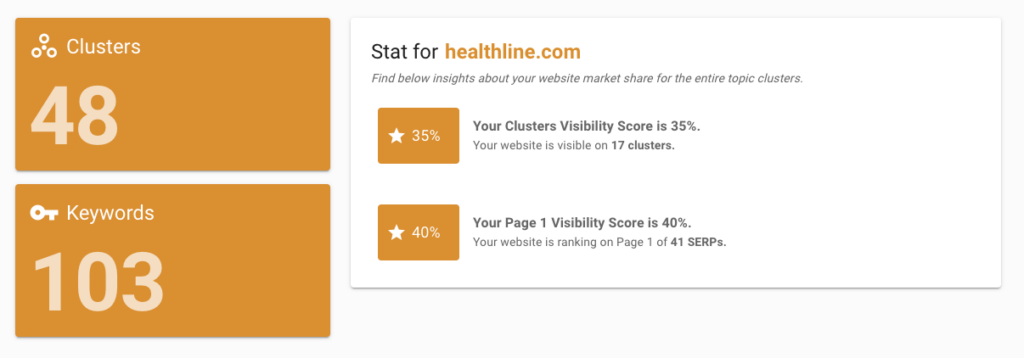
Workflow and integration with SEO
Most keyword clustering tools offer integrations or enable the use of add-on features to accelerate content production efforts.
For instance, a keyword clustering tool that helps create content brief templates.
With a readymade template, you can cover a range of content types in your strategy by optimizing workflow.
Flexibility of cluster creation
An effective keyword clustering tool should offer flexibility when creating clusters, allowing users to manually review the keyword data.
To influence the clustering process, you can use filters like user behavior, search intent, and more to efficiently create keyword clusters.
Most tools automate the clustering process using algorithms and other pre-defined criteria. This helps save a lot of time when you’re dealing with large volumes of keyword data.
API and data export
Some keyword clustering tools may offer an API or export features to users who want to shift their data from one system to another.
Once the data is exported, you can share it with other team members to streamline your workflow.
While it isn’t a mandatory factor to consider, you can consider it a bonus if your keyword cluster tool features this.
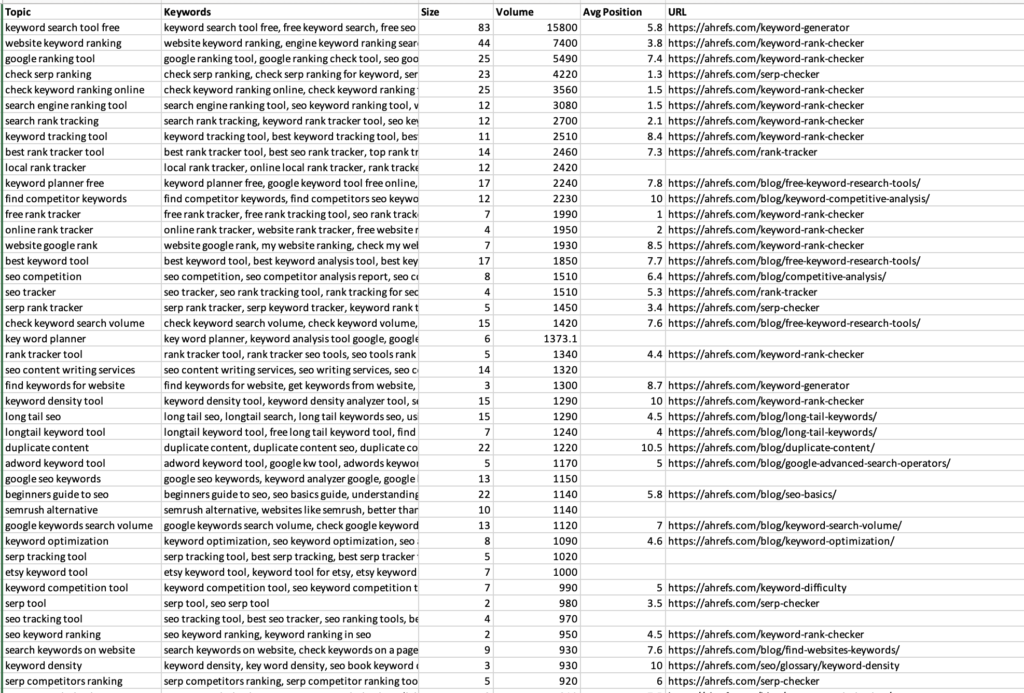
Cost and pricing model
Another important factor to consider is the total cost of purchasing, integrating, and maintaining the keyword cluster tool.
The pricing model will always vary.
For instance, some tools will require you to have a subscription, while others will require you to purchase credits.
You can also study competitor prices and quotes to get a better estimate, but it’s important to pick a tool that suits your business model and budget.
Top Keyword Clustering Tools
1 – thruuu
thruuu is an all-in-one content solution for SEO experts and content strategists featuring great features including a keyword clustering solution.
The thruuu keyword clustering tool is perfect for companies aiming to build a topic cluster model strategy.
Start by uploading a list of keywords from Ahref, SEMRush, Google Search Console or any other keyword tool of your choice and thruuu will automatically group them.
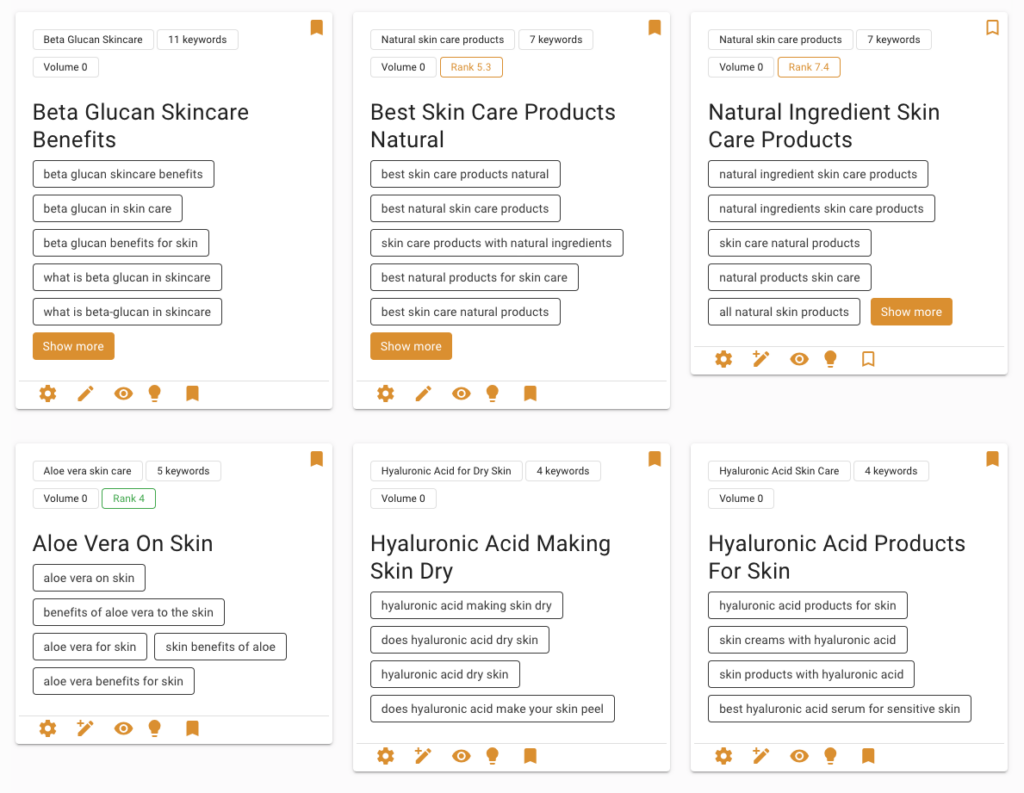
The keyword clustering follows a SERP-based algorithm with automated grouping to make the process more accurate and aligned with the user search intent.
The thruuu keyword cluster tool offers a unique feature by analyzing the competitor data within each single group of keywords.
This feature will give you great insights into your competitors strategy giving you information about the number of words, the most frequent keyword, the heading structure, and more of each article inside a cluster.
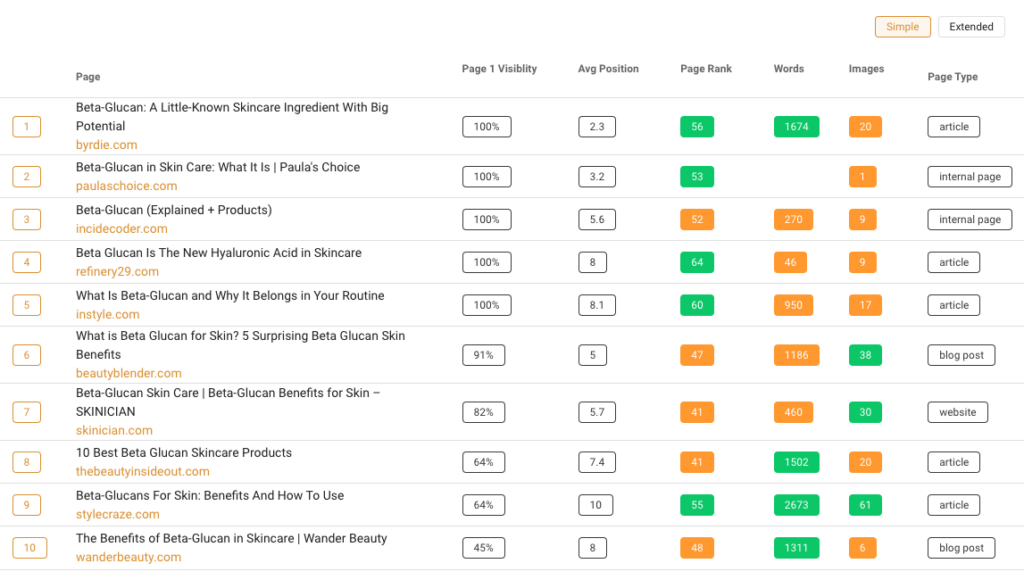
Finally, the keyword clustering tool is seamlessly integrated in a content workflow and you can create content briefs or audit your website.
Key Features
- A great user interface
- Content cluster analysis and SEO insights
- Seamless content workflow integrated with the content brief generator
Type of Clustering: SERP Based algorithm
Pricing: Start for free and cluster 500 keywords. The first plan costs $19 per month and lets you cluster up to 750 keywords.
Get Started and Cluster 500 Keywords for Free
Organize your content for improved SEO and user experience with our Keyword Clustering and Topic Clusters feature
2 – Keyword Cupid
Keyword Cupid allows you to cluster thousands of keywords in a single shot. It uses machine learning algorithms to group together keywords based on your terms and provides on-page insights on ranking and visibility.
The user interface is not really user-friendly, but you can download the cluster file in Excel format, covering metrics like search volume, cost-per-click, and more.
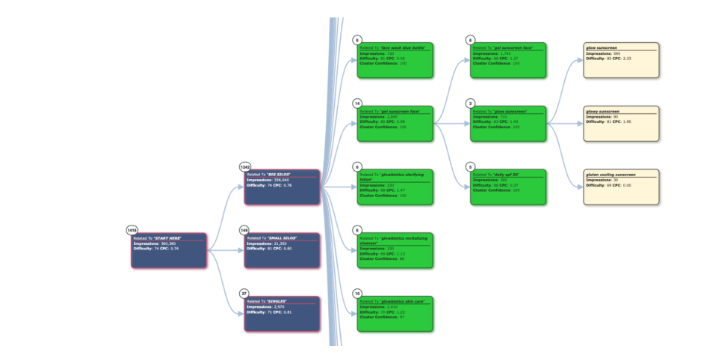
The tool also features various add-on such as a plug-in called SERP Spy that assists with on-page optimization so users can create the perfect interlinking strategy.
To access the add-ons, you must pay at least $49 per month, which can increase the bill if you want a full access to the tool
Key Features
- Cluster 80,000 keywords with the most expensive plan
- Several add-ons
- A neural network clustering
Type of Clustering: Machine Learning
Pricing: Start for free. The first plan costs $9.99 per month and lets you cluster up to 500 keywords monthly.
3 – Cluster AI
ClusterAI also uses data from SERPs when crawling, analyzing, and grouping keywords. It matches every search phrase against every keyword and then compares the number of pages each keyword ranks for both set of information.
While the clustering tool does deliver results from Google, it lacks a couple of things. For instance, it doesn’t allow users to view the cluster file before exporting it.

Though it makes keyword research more efficient and time-worthy, the tool still needs to integrate more proxies so it can be more useful to users.
Also, the tool lacks a proper user interface to browse the cluster. You can only access the cluster via the exported file. This limits your scope of information.
When it comes to pricing structure, you can use the tool in the trial version. Otherwise, the tool pricing varies based on the number of credits you need.
Key Features
- Import files from SEMRush or Ahref
- Export to CSV
Type of Clustering: SERP Based
Pricing: Start for free with 200 keywords. The first plan costs $39.00 per month and lets you cluster up to 1000 keywords monthly.
4 – Keyclusters
Keycluster is one of the simplest clustering tools to use that’s ideal for content marketing beginners.
All you need to do is upload your keyword data and receive a file that neatly groups together essential search terms.
This keyword clustering tool also uses real-time SERP data to group keywords based on the number of times the same pages appear in the top 10 results.
It has a basic dashboard that enables users to cluster keywords based on factors like language preference, geolocation, and more. You get 100 free credits in the basic version that you can use once you sign up for the tool.

But the tool does come with limitations, as it cannot export data in Excel format or doesn’t offer an elegant user interface to explore the keyword cluster.
But it can provide value for money as it’s the cheapest clustering tool that’s available in the market.
Key Features
- Cheap
- Simple
Type of Clustering: SERP Based
Pricing: Start for free with 100 credits. Then you can purchase credits starting at 9$ for the first bundle. There is no subscription.
5 – Keyword Insights
Here’s another useful tool for generating and analyzing thousands of keywords.
The tool lets you group your keyword list together using a clustering feature. The export feature is quite remarkable as it shows the data from various angle and offer a pivot table.
So, if you struggle with Excel, this tool will facilitate this task.
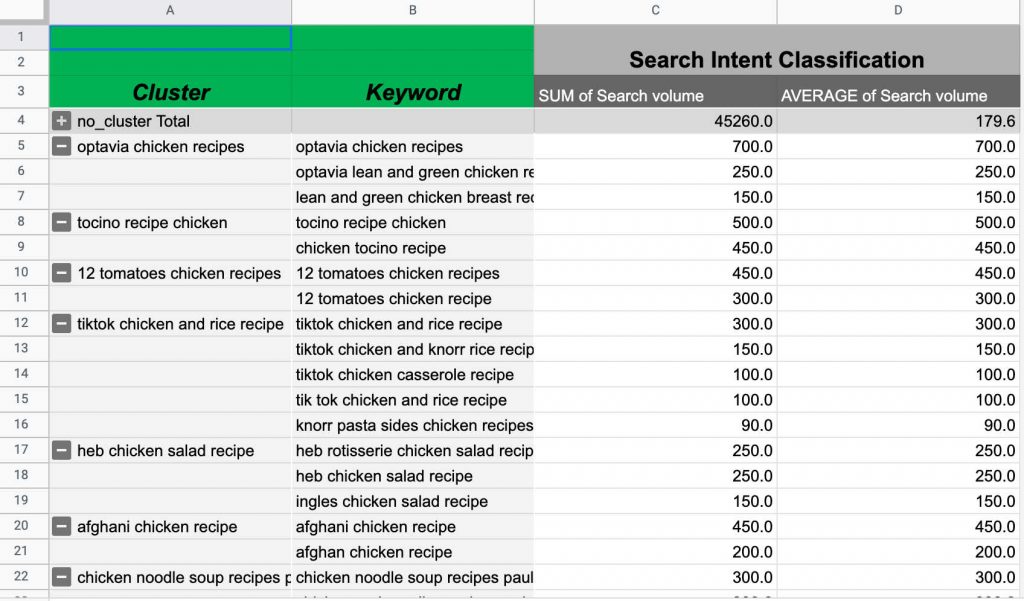
Keyword Insights helps create article outlines, assisting with the writing process.
To test the tool, you will have unfortunately to pay 1$ as it doesn’t offer a free trial.
Key Features
- Export data to Excel with a Pivot table
- Analyze Search intent
- Integrate with a content outlining feature
Type of Clustering: SERP Based
Pricing: Pay 1$ for the trial, then the first package cost $58 per month for 12,000 keywords monthly.
How to Effectively Use Keyword Clustering Tools
Define a core topic
The first stage of keyword clustering is determining the main theme or primary subject of the content.
This theme must align with your business and the industry you operate in.
It should be relevant to your target audience and must include a range of sub-topics or queries you can talk about in detail.

Create a list of keywords
You can start looking for essential search terms based on the seed keyword.
We recommend using a keyword research tool in this case to finalize a set of search terms that closely relate to the seed keyword.
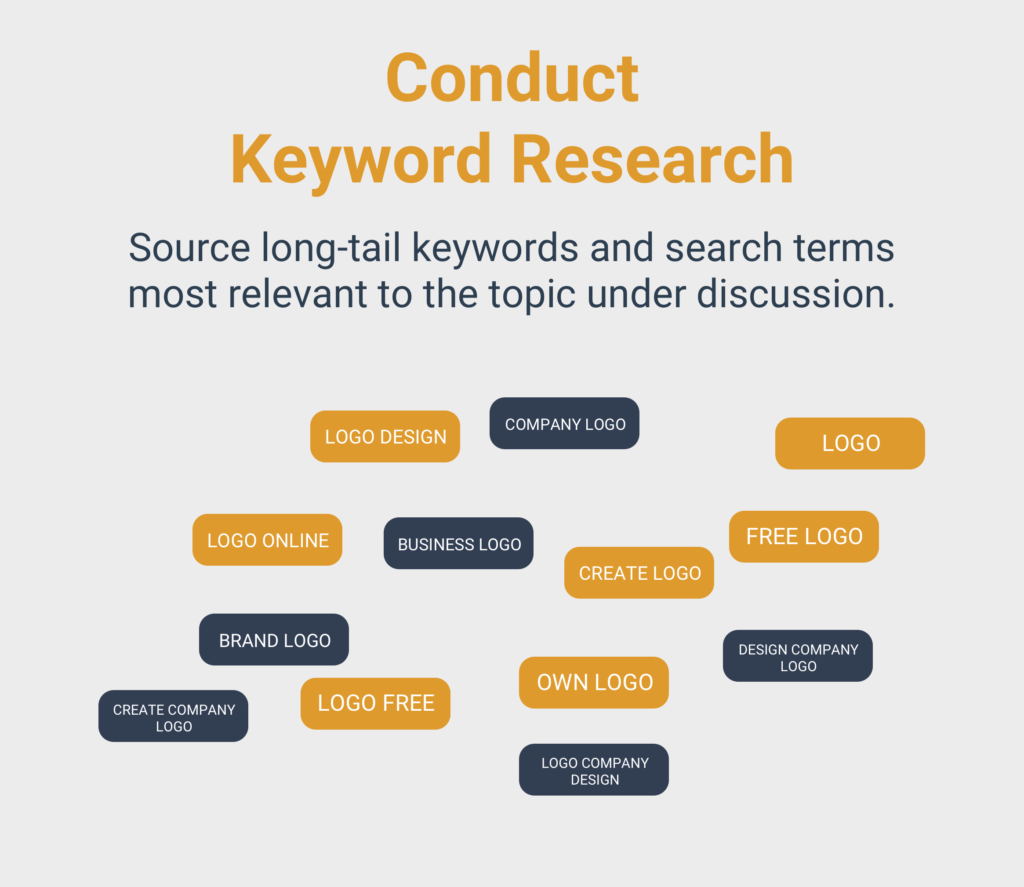
Select the best keyword clusters
Once you use a keyword cluster tool to filter through your data, you’ll end up with a list of keyword clusters that contains everything you need to create topic clusters and a pillar page.
Pick the most relevant keyword clusters and create associated content.
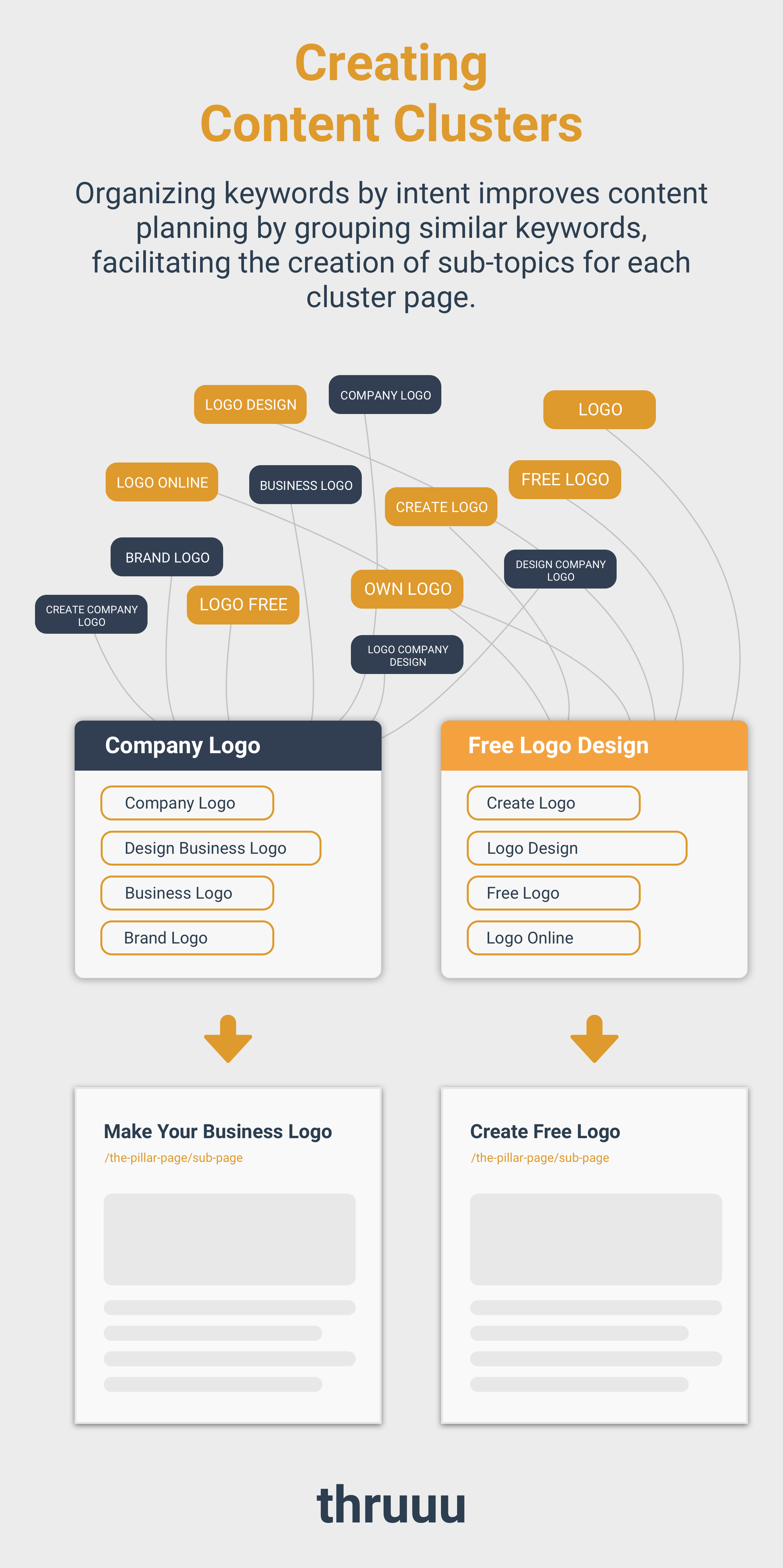
Define your pillar page
You must define the format of the pillar page and the subtopics you’ll be covering and ensure all content is related to the main theme.
The content should address relevant queries of the target audience.
The pillar page should also interlink necessary information to other cluster pages.
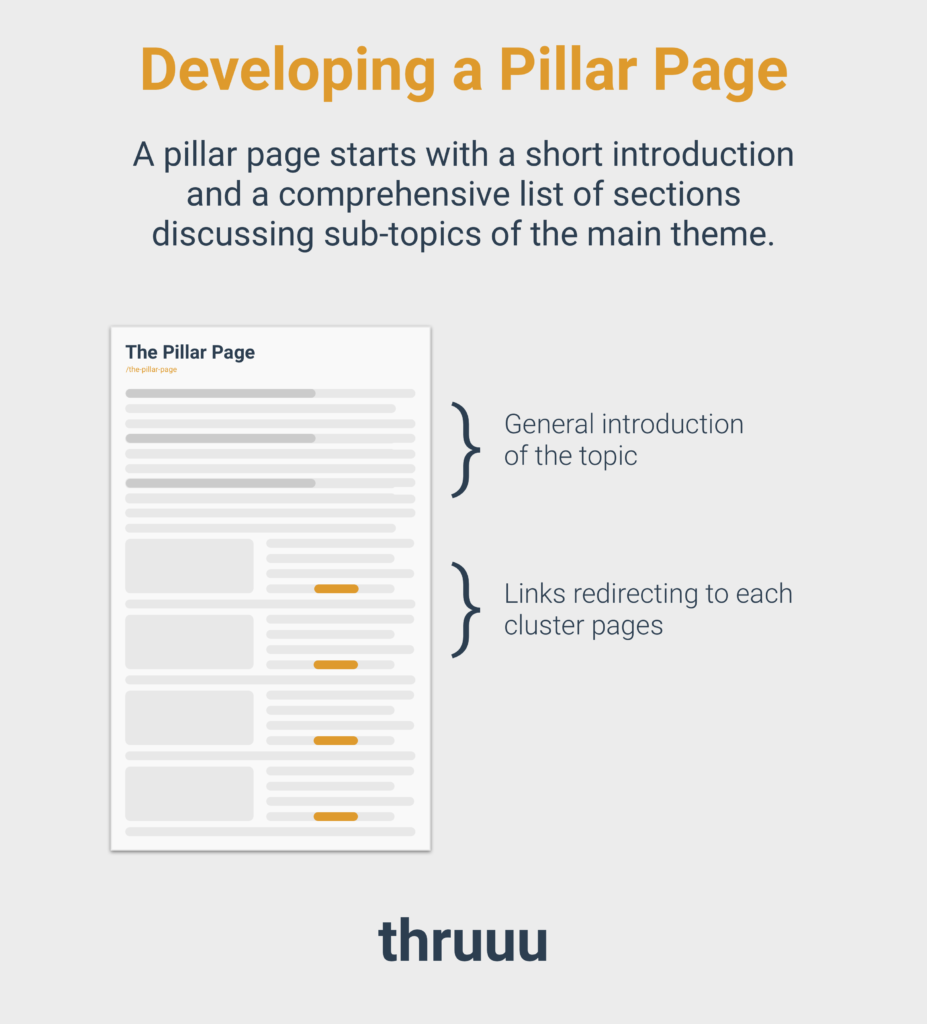
Build a content plan and strategy
Build a content plan that covers a lot of information about the core topic in the form of a pillar page and cluster pages.
You can create one article per keyword cluster.
You can build the content further by covering more topics and keywords and by interlinking each article with the pillar page.
Watch the video below to understand how to build a content plan by using a keyword clustering tool.
FAQs About Keyword Clustering Tools
How do keyword clustering tools work?
Keyword clustering tools typically put together search terms that have similar intent or show the same SERP similarity.
The idea here is that when Google shows the same results for many keywords, they have the same intent and should be targeted on the same page.
As a result, your content becomes more SEO-friendly with keyword clustering, helping you achieve topical authority.
For instance, when you use the thruuu keyword clustering tool, it will analyze live data from SERPs and group together keywords that are more relevant to your search.
📖 Continue Reading: What is keyword clustering?
What is the difference between a keyword research and a clustering tool?
A keyword research tool provides keyword data around a query, phrase, or generic search term.
You can learn more about a seed keyword by analyzing search trends, ranking factors, search volume and difficulty, and more using such a tool.
However, a keyword research tool will not create clusters or group relevant terms together.
For that, you need a keyword clustering tool that specializes in filtering, sorting, and grouping keywords and applying SERP analytics.
A keyword grouping tool essentially automates the clustering process for faster content production.
How does keyword clustering help with content planning?
Keyword clustering improves content production efforts by minimizing the hours you spend on research, analytics, and strategy.
By following a keyword cluster strategy, you can create a ton of content around a core topic and achieve topical authority.
Once you have keyword clusters in place, it’s easier to define the topics you can cover and choose the type of content you want to create.
A clustering tool will also reduce the number of resources you would use in research and analytics.
With a single tool, you can deal with tons of keyword data at a fast pace, which makes it easier to plan, organize, and delegate content workflow in an organization.
For most content marketers, a keyword clustering tool is a useful tool.
What are the benefits of using keyword clustering tools?
Save time, money, and resources
With a keyword clustering tool, SEO analysts and content marketers can free up more time and resources for writing, updating, and distributing their content.
Such a tool helps automate the keyword clustering process, which is useful when you’re dealing with tons of keywords and need to create a lot of content.
It sorts keywords based on their SERP score and search intent so you can have a ready-made list of clusters.
Avoid keyword cannibalization
Keyword clusters ensure you don’t target the same search term for multiple pages.
A keyword clustering tool filters the keyword data you provide by removing duplicate search terms.
Once you’ve downloaded your cluster file, you can start finalizing the articles you want to cover per cluster. As a result, all your content is unique, and there’s no excessive use of keywords.
This reduces the chances of keyword cannibalization.
Improve content structure and authority
A keyword cluster strategy can improve site architecture as it provides a comprehensive outlook about a core subject.
Using keyword clusters, you can integrate long-tail keywords in your content, use keyword-rich anchors in your text, and more.
There are many ways in which you can plan your content strategy using keyword clusters.
Keyword clustering ensures you cover a topic in detail by prioritizing relevant search terms that help you achieve topical authority over a subject.
For instance, you can capitalize on older content by updating blogs and articles with a keyword cluster.
Increase SEO ranking across SERPs
As discussed before, keyword clustering is essential in SEO because it ensures your content maintains keyword authority across SERPs.
Using keyword clusters can increase the ranking and visibility of a web page, especially when there are plenty of quality backlinks and internal links within the content.
As a result, users and search engines find it easier to discover your content. As you begin to receive more traffic on your web pages, the search engine ranking of those pages also increases.
How do keyword clustering tools help with a topic cluster strategy?
Topic clusters are grouped pages that revolve around a core topic or main theme and its corresponding sub-topics.
With a keyword clustering tool, you can filter through a large volume of data and end up with a final list of keywords that are most relevant to your target audience and their search intent.
Once you have a list of keyword clusters, you can create content per cluster or draft articles for a topic cluster that targets a keyword cluster.
Keyword clusters are essential in a topic cluster strategy when you want to achieve topical authority so that search engines recognize your website as an authoritative resource.
Empower Your Content Team
Our end-to-end content optimization solution empowers your team to crack the Google algorithm, craft exceptional content, and achieve remarkable organic search results.
